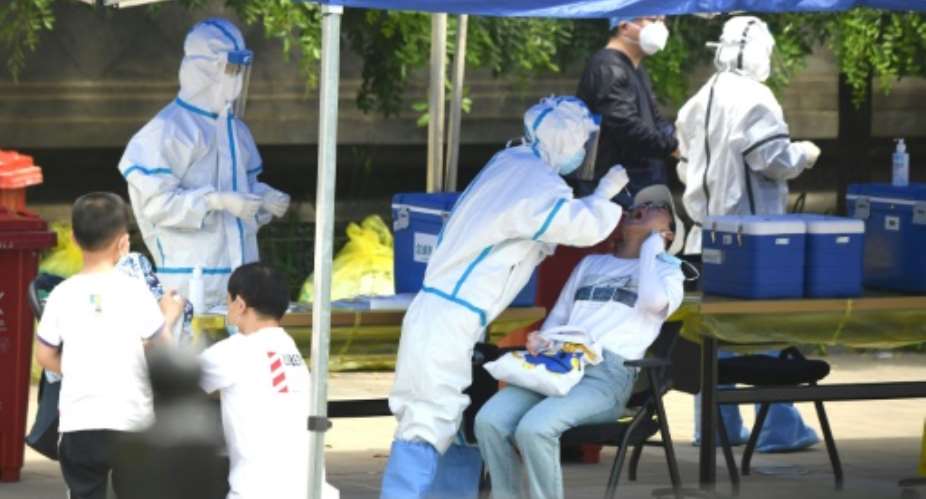China's capital was facing an "extremely severe" coronavirus threat on Tuesday, as New Zealand reported its first new infections in almost a month and fears mounted that the deadly pandemic is still far from under control.
More than eight million people have now been infected with the virus worldwide since it first emerged in China late last year -- with more than 436,813 deaths -- and the tolls are still surging in Latin America and South Asia.
However, British researchers were hailing a potential "major breakthrough" on Tuesday with a steroid treatment saving the lives of one-third of seriously ill patients in clinical trials.
British officials said patients would immediately have access to the steroid, dexamethasone.
Even without an effective treatment, caseloads and death rates have declined across Europe.
The UK, however, is still struggling with the world's third largest outbreak and New Zealand said the two new cases reported there were recent arrivals from Britain.
The South Pacific nation had declared last week that it had ended community transmission of the virus.
European countries are eager to drop coronavirus restrictions to save the imminent summer tourist season, but Spain warned that it may quarantine British visitors should the UK persist with its plan to quarantine all overseas arrivals.
And the latest reminder of the threat came from China, which had largely brought its outbreak under control, as 27 new infections were reported in Beijing, where a new cluster linked to a wholesale food market has sparked mass testing and neighbourhood lockdowns.
"The epidemic situation in the capital is extremely severe," Beijing city spokesman Xu Hejian warned, as the number of confirmed infections soared to 106.
While these cases have caused concern about a resurgence in countries that had suppressed their outbreaks, the disease is gaining momentum in other regions with massive populations.
Known infections in India have crossed 330,000, and already stretched authorities are bracing for the monsoon season, which causes outbreaks of illnesses such as dengue fever and malaria every year.
Vastly experienced doctor Vidya Thakur, medical superintendent at Mumbai's Rajawadi Hospital, is used to managing "heavy burdens", she says.
But COVID-19 "has left us helpless... and the monsoon will make things even more difficult", she says.
Oscars postponed
In Latin America, countries are struggling to contain the disease while trying to ease the crushing economic blow dealt by widespread lockdowns and social distancing measures.
Peru reported its economy shrank by more than 40 percent year-on-year in April, while Chile extended its state of emergency by three months as it struggles with a controversy over how it is counting COVID-19 deaths.
Ecuador, which has the region's fourth highest official virus death toll after Brazil, Mexico and Peru, has extended its state of emergency for 60 more days.
This allowed the government to keep in place restrictions including a curfew, the mobilisation of the armed forces and suspension of rights such as freedom of assembly.
In the United States, the world's worst-hit nation, there have been flare-ups in some states.
But President Donald Trump's administration insists there will be no new economic shutdown even if a second wave hits.
A return to normal still looks distant, however, with the Oscars postponed by two months, the latest casualty of an already interrupted sports and entertainment calendar.
Borders reopen in Europe
After a gradual drop in new cases, European nations including Belgium, France, Germany and Greece lifted border restrictions hoping to boost tourism and travel over the summer months.
But disruptions to normal social and economic life will continue.
In Britain, the Premier League football season resumes on Wednesday, but in empty stadiums.
There are fears some supporters will ignore social-distancing rules by congregating outside the grounds where their teams are playing, risking new clusters of infections.
But league chief executive Richard Masters said: "Please stay away and enjoy the matches at home. By turning up to the game you are putting things at jeopardy."
In Singapore, the transport minister said construction of a major new airport terminal will be halted for at least two years as the global travel sector struggles to recover.
Hungary, however, did take a step towards the post-virus world, when MPs voted to revoke the emergency powers given to Prime Minister Viktor Orban to help tackle the crisis.
burs-dc/jxb





 Burkina Faso expels French diplomats for 'subversive activities'
Burkina Faso expels French diplomats for 'subversive activities'
 GOIL reduces petrol price by 29 pesewas, sells GHC14.70 per litre
GOIL reduces petrol price by 29 pesewas, sells GHC14.70 per litre
 The disrespect towards security is terrible; we can do better — Atik Mohammed co...
The disrespect towards security is terrible; we can do better — Atik Mohammed co...
 Starlink to cease connection in Ghana, other “unavailable” countries on April 30...
Starlink to cease connection in Ghana, other “unavailable” countries on April 30...
 MMCEs, DCEs and Regional Ministers must be elected to reduce political interfere...
MMCEs, DCEs and Regional Ministers must be elected to reduce political interfere...
 National Cathedral: ‘Nonsense; you take taxes from broke Ghanaians to dig a clum...
National Cathedral: ‘Nonsense; you take taxes from broke Ghanaians to dig a clum...
 April 18: Cedi sells at GHS13.59 to $1, GHS13.01 on BoG interbank
April 18: Cedi sells at GHS13.59 to $1, GHS13.01 on BoG interbank
 We must harness the collective power and ingenuity of female leaders to propel o...
We must harness the collective power and ingenuity of female leaders to propel o...
 Saglemi Housing Project will not be left to rot – Kojo Oppong Nkrumah
Saglemi Housing Project will not be left to rot – Kojo Oppong Nkrumah
 Asantehene commends Matthew Opoku Prempeh for conceiving GENSER Kumasi Pipeline ...
Asantehene commends Matthew Opoku Prempeh for conceiving GENSER Kumasi Pipeline ...
